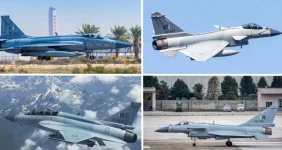- Views: 6K
- Replies: 24

Pakistan is poised to significantly enhance its air force capabilities through advanced discussions with Turkey to establish a domestic production facility for the fifth-generation TAI Kaan stealth fighter jet. This move represents a strategic leap for Pakistan's defence capabilities, aiming to produce a local variant of this cutting-edge aircraft.
This initiative comes alongside Pakistan's ongoing negotiations to acquire 40 Shenyang J-35 stealth fighter jets from China, intended to modernize its air fleet by replacing aging F-16s and French Mirage fighters.
According to a Turkish media report, the discussions with Turkey extend beyond mere exports, focusing on joint development ventures, including helicopters. This highlights a commitment to deepening defence technology collaboration and industrial partnerships between the two nations.
Reports indicate that Pakistan may officially join the Kaan stealth aircraft project, with multiple subsystems slated for local manufacture. Establishing a joint production line could significantly alleviate financial pressures while boosting local employment.
An anonymous source quoted by EurAsian Times stated, "Pakistan might have officially joined the Kaan stealth aircraft project. Multiple subsystems would be manufactured in Pakistan. A joint production line is likely being established. This will reduce the financial burden considerably and provide jobs for Pakistanis."
This strategic shift towards diversifying military procurement comes amidst concerns from the Indian Air Force (IAF). Air Chief Marshal A.P. Singh has voiced worries about the rapid enhancement of both Pakistani and Chinese air forces, contrasting it with the IAF's delays in receiving its domestically produced Tejas aircraft.
He noted, "Pakistan may not be able to afford two different stealth fighters due to its economic constraints. However, the discussions with Turkey are a sign that Pakistan understands the need to diversify its military equipment beyond reliance on Chinese supply."
The collaboration with Turkey on the Kaan project, therefore, transcends the acquisition of new aircraft. It signifies a move to forge stronger defence ties with a NATO member and a nation with burgeoning defence technology. As Air Chief Marshal Singh further remarked, "Through Kaan, they strengthen their defence cooperation with a trusted and reliable partner, Turkey."
This development has significant implications for the regional security landscape. Pakistan's pursuit of both the J-35 and the Kaan signals its ambition to enhance its air power significantly. It also highlights the growing defence cooperation between Pakistan and Turkey, potentially leading to a more diversified and potent Pakistani air force in the years to come.

